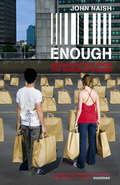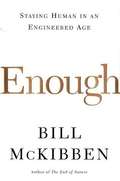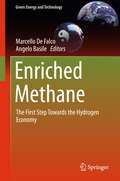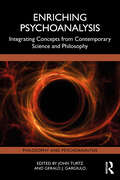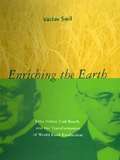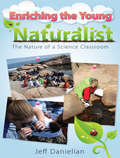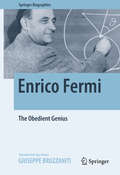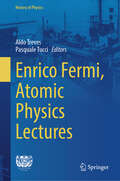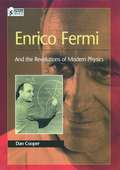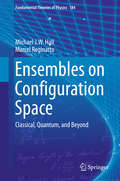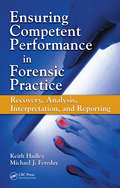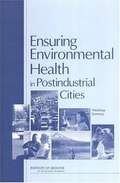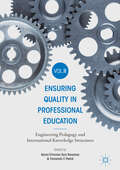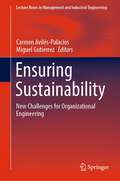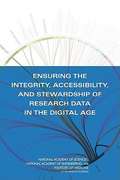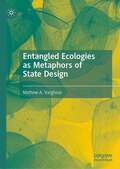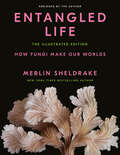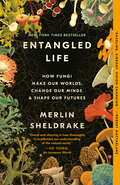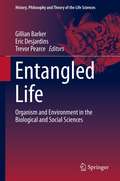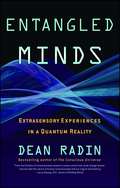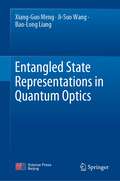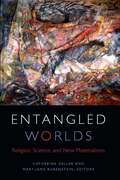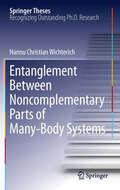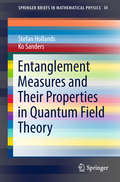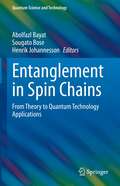- Table View
- List View
Enough
by John NaishFor millions of years, humankind has used a brilliantly successful survival strategy. If we like something, we chase after more of it: more status, more food, more info, more stuff. Then we chase again. Its how we survived famine, disease and disaster to colonise the world. But now, thanks to technology, weve suddenly got more of everything than we can ever use, enjoy or afford. That doesnt stop us from striving though and its making us sick, tired, overweight, angry and in debt. It burns up our personal ecologies and the planets ecology too. We urgently need to develop a sense of enough. Our culture keeps telling us that we dont yet have all we need to be happy, but in fact we need to nurture a new skill the ability to bask in the bounties all around us. ENOUGH explores how our Neolithic brain-wiring spurs us to build a world of overabundance that keeps us hooked on more. John explains how, through adopting the art of enoughness, we can break from this wrecking cycle. With ten chapters on topics such as Enough food, Enough stuff, Enough hurry and Enough information, he explores how we created the problem and gives us practical ways to make our lives better.
Enough: Staying Human in an Engineered Age
by Bill MckibbenWe are on the verge of crossing the line from born to made, from created to built. Sometime in the next few years, a scientist will reprogram a human egg or sperm cell, spawning a genetic change that could be passed down into eternity. We are sleepwalking toward the future, argues Bill McKibben, and it's time to open our eyes. In "The End of Nature", nearly fifteen years ago, McKibben demonstrated that humanity had begun to irrevocably alter--and endanger--our environment on a global scale. Now he turns his eye to an array of technologies that could change our relationship not with the rest of nature but with ourselves. He explores the frontiers of genetic engineering, robotics, and nanotechnology--all of which we are approaching with astonishing speed--and shows that each threatens to take us past a point of no return. We now stand at a critical threshold, poised between the human past and a post-human future. Ultimately, McKibben offers a celebration of what it means to be human, and a warning that we risk the loss of all meaning if we step across the threshold. His wise and eloquent book argues that we cannot forever grow in reach and power--that we must at last learn how to say, 'Enough.'
Enriched Methane
by Angelo Basile Marcello FalcoThis book brings together recent research from across the world on enriched methane, and examines the production, distribution and use of this resource in internal combustion engines and gas turbines. It aims to provide readers with an extensive account of potential technological breakthroughs which have the capacity to revolutionize energy systems. Enriched methane, a gas mixture composed by methane and hydrogen (10-30%vol), constitutes the first realistic step towards the application of hydrogen as an energy vector. It provides strong benefits in terms of emissions reduction, that is -11% of CO2, eq emission with the combustion of a 30%vol H2 mixture, if hydrogen is produced from renewable energy sources. Enriched methane offers the following advantages: * it can be produced at competitive costs; * it can be distributed by means of the medium pressure natural gas grid; * it can be stored in traditional natural gas storage systems; This book is intended for academics in chemical engineering and energy production, distribution and storage. It is also intended for energy producers, engineering companies and R&D organizations.
Enriching Psychoanalysis: Integrating Concepts from Contemporary Science and Philosophy (Philosophy and Psychoanalysis)
by Gerald J. Gargiulo John TurtzThis compelling collection illuminates new models and metaphors taken from the contemporary sciences and philosophical thought to revitalize and recontextualize psychoanalysis for the 21st century. The exploration of quantum mechanics, chaos and complexity theory, epigenetics, and neuropsychoanalysis provides the reader with new layers of meaning and understanding that in turn lead to an enriching of psychoanalytic theory and a deepening of experience in the consulting office. The intersection of psychoanalysis, contemporary sciences, and philosophy leads the reader to new worlds that can transform the lens from which one views the psychoanalytic process. Written for psychoanalysts and psychotherapists, as well as scholars of psychoanalysis that are interested in the intersection of psychoanalysis, contemporary science, and philosophy, Enriching Psychoanalysis: Integrating Concepts from Contemporary Science and Philosophy expands the focus and meaning of current psychoanalytic theory and practice.
Enriching the Earth: Fritz Haber, Carl Bosch, and the Transformation of World Food Production
by Vaclav SmilThe industrial synthesis of ammonia from nitrogen and hydrogen has been of greater fundamental importance to the modern world than the invention of the airplane, nuclear energy, space flight, or television. The expansion of the world's population from 1. 6 billion people in 1900 to today's six billion would not have been possible without the synthesis of ammonia. In Enriching the Earth, Vaclav Smil begins with a discussion of nitrogen's unique status in the biosphere, its role in crop production, and traditional means of supplying the nutrient. He then looks at various attempts to expand natural nitrogen flows through mineral and synthetic fertilizers. The core of the book is a detailed narrative of the discovery of ammonia synthesis by Fritz Haber -- a discovery scientists had sought for over one hundred years -- and its commercialization by Carl Bosch and the chemical company BASF. Smil also examines the emergence of the large-scale nitrogen fertilizer industry and analyzes the extent of global dependence on the Haber-Bosch process and its biospheric consequences. Finally, it looks at the role of nitrogen in civilization and, in a sad coda, describes the lives of Fritz Haber and Carl Bosch after the discovery of ammonia synthesis.
Enriching the Young Naturalist: The Nature of a Science Classroom
by Jeff Danielianscience education
Enrico Fermi
by Giuseppe BruzzanitiThis biography explores the life and career of the Italian physicist Enrico Fermi, which is also the story of thirty years that transformed physics and forever changed our understanding of matter and the universe: nuclear physics and elementary particle physics were born, nuclear fission was discovered, the Manhattan Project was developed, the atomic bombs were dropped, and the era of "big science" began. It would be impossible to capture the full essence of this revolutionary period without first understanding Fermi, without whom it would not have been possible. Enrico Fermi: The Obedient Genius attempts to shed light on all aspects of Fermi's life - his work, motivation, influences, achievements, and personal thoughts - beginning with the publication of his first paper in 1921 through his death in 1954. During this time, Fermi demonstrated that he was indeed following in the footsteps of Galileo, excelling in his work both theoretically and experimentally by deepening our understanding of the Pauli exclusion principle, winning the Nobel Prize for his discovery of the fundamental properties of slow neutrons, developing the theory of beta decay, building the first nuclear reactor, and playing a central role in the development of the atomic bomb. Interwoven with this fascinating story, the book details the major developments in physics and provides the necessary background material to fully appreciate the dramatic changes that were taking place. Also included are appendices that provide a timeline of Fermi's life, several primary source documents from the period, and an extensive bibliography. This book will enlighten anyone interested in Fermi's work or the scientific events that led to the physics revolution of the first half of the twentieth century.
Enrico Fermi, Atomic Physics Lectures (History of Physics)
by Aldo Treves Pasquale TucciIn autumn of 1949, Enrico Fermi returned to Italy after an eleven-year absence to deliver nine lectures, six in Rome and three in Milan. Apart from subsequent limited publication, this material has been little seen by the larger scientific community. This volume represents the first time that these nine lectures have been published in English. The nine lectures collected in this book represent a precious document of Fermi’s view on topics with which he had engaged in the previous decades. They were addressed to the young Italian physicists and to a more general audience only then beginning to recover from the physical and moral disruption of the war. Published in collaboration with the Italian Physical Society (SIF), the book includes a presentation of the president of SIF, an introduction written by the editors, and two substantial essays: one on Fermi’s life, and a second on Fermi’s skill in talking about Physics in a clear and sparkling manner. The volume appears as a contribution to the 70th anniversary of Fermi's death, and should appeal not only to students of physics, but to both those with an interest in the history of science in general and those who wish for a clearer picture of the life and mind of this pioneering physicist.
Enrico Fermi: And The Revolutions Of Modern Physics (Oxford Portraits In Science Ser.)
by Dan CooperIn 1938, at the age of 37, Enrico Fermi was awarded the Nobel Prize in Physics. That same year he emigrated from Italy to the United States and, in the course of his experiments, discovered nuclear fission--a process which forms the basis of nuclear power and atomic bombs. Soon the brilliant physicist was involved in the top secret race to produce the deadliest weapon on Earth. He created the first self-sustaining chain reaction, devised new methods for purifying plutonium, and eventually participated in the first atomic test. This compelling biography traces Fermi's education in Italy, his meteoric career in the scientific world, his escape from fascism to America, and the ingenious experiments he devised and conducted at the University of Rome, Columbia University, and the Los Alamos laboratory. The book also presents a mini-course in quantum and nuclear physics in an accessible, fast-paced narrative that invokes all the dizzying passion of Fermis brilliant discoveries. Oxford Portraits in Science is an on-going series of scientific biographies for young adults. Written by top scholars and writers, each biography examines the personality of its subject as well as the thought process leading to his or her discoveries. These illustrated biographies combine accessible technical information with compelling personal stories to portray the scientists whose work has shaped our understanding of the natural world.
Ensembles on Configuration Space
by Michael J. W. Hall Marcel ReginattoThis book describes a promising approach to problems in the foundations of quantum mechanics, including the measurement problem. The dynamics of ensembles on configuration space is shown here to be a valuable tool for unifying the formalisms of classical and quantum mechanics, for deriving and extending the latter in various ways, and for addressing the quantum measurement problem. A description of physical systems by means of ensembles on configuration space can be introduced at a very fundamental level: the basic building blocks are a configuration space, probabilities, and Hamiltonian equations of motion for the probabilities. The formalism can describe both classical and quantum systems, and their thermodynamics, with the main difference being the choice of ensemble Hamiltonian. Furthermore, there is a natural way of introducing ensemble Hamiltonians that describe the evolution of hybrid systems; i. e. , interacting systems that have distinct classical and quantum sectors, allowing for consistent descriptions of quantum systems interacting with classical measurement devices and quantum matter fields interacting gravitationally with a classical spacetime.
Ensuring Competent Performance in Forensic Practice: Recovery, Analysis, Interpretation, and Reporting
by Keith Hadley Michael J. FeredayThis is the first book of its kind to encourage a common understanding of competence and demonstrate the application of standards and practice in all aspects of forensic science including collection of evidence, interpretation of scientific analysis, and appropriate methods of testimony. The authors stress the standardization of proper training and testing procedures and give clear guidelines for effective training programs based on occupational standards. The book examines the importance of workplace assessments of competence and emphasizes the role of those involved in the assessment process. The authors include several case studies demonstrating competence in practice and the methods to ensure consistent high standards in the future.
Ensuring Environmental Health in Postindustrial Cities: Workshop Summary
by Medicine Research Roundtable on Environmental Health SciencesInformation on Ensuring Environmental Health in Postindustrial Cities
Ensuring Quality in Professional Education Volume II: Engineering Pedagogy and International Knowledge Structures
by Tara Newman Karen Trimmer Fernando F. PadróThis book examines quality teaching in professional education in the fields of engineering and international knowledge structures. The second of a two-volume series, the editors and contributors structure the book around case studies which highlight the elements constituting good practice within professional education. While there is no one specific route to prepare well-qualified professionals, this volume explores the decisions the academics responsible for delivering this education make to ensure quality curricula. Ultimately, the key to effective preparations rests with the value employers place on the focus, emphasis and balance between the academic and practical in relation to their own expectations for skills that graduates must have. The second volume in this collection will appeal to students and scholars of professional pedagogy, and engineering pedagogy more specifically.
Ensuring Sustainability: New Challenges for Organizational Engineering (Lecture Notes in Management and Industrial Engineering)
by Carmen Avilés-Palacios Miguel GutierrezThis book presents a selection of the best papers given at the XXIV International Conference on Industrial Engineering and Industrial Management. The conference is promoted by ADINGOR (Asociación para el Desarrollo de la Ingeniería de Organización) and organized by the Universidad Politécnica de Madrid and the Universidad Carlos III de Madrid. It took place at the Universidad Carlos III de Madrid (Leganés, Spain) in July 2020. Ensuring Sustainability embodies the latest advances in research and cutting-edge analyses of real case studies in industrial engineering and operations management from diverse international contexts. It also identifies business applications for the latest findings and innovations in operations management and the decision sciences.
Ensuring the Integrity, Accessibility, and Stewardship of Research Data in the Digital Age
by Institute of MedicineAs digital technologies are expanding the power and reach of research, they are also raising complex issues. These include complications in ensuring the validity of research data; standards that do not keep pace with the high rate of innovation; restrictions on data sharing that reduce the ability of researchers to verify results and build on previous research; and huge increases in the amount of data being generated, creating severe challenges in preserving that data for long-term use. Ensuring the Integrity, Accessibility, and Stewardship of Research Data in the Digital Age examines the consequences of the changes affecting research data with respect to three issues - integrity, accessibility, and stewardship-and finds a need for a new approach to the design and the management of research projects. The report recommends that all researchers receive appropriate training in the management of research data, and calls on researchers to make all research data, methods, and other information underlying results publicly accessible in a timely manner. The book also sees the stewardship of research data as a critical long-term task for the research enterprise and its stakeholders. Individual researchers, research institutions, research sponsors, professional societies, and journals involved in scientific, engineering, and medical research will find this book an essential guide to the principles affecting research data in the digital age.
Entangled Ecologies as Metaphors of State Design
by Mathew A. VargheseThis book takes a unique approach to the ethnographic and analytical explorations of ecologies in the making. The core theme of the work will be the emerging anthropocene contexts that simultaneously bring unprecedented human interactions with the non-human as well as the emergence of hybrid ecologies. There will be dependence on existing literature, own ethnographic work that has already went into this, the closer introspection of immediate geographies as well as the pertinent debates. There has been a reconfiguration of meaning and nature of spaces in the context of social relations produced by neo-liberal globalization. States as they have been are transforming and are influenced by policies made beyond borders. This work is marked out by careful enquiry on ecologies in the making with the backdrop of distinct regional developmentalist trajectories as well as specific ethnography from Kerala, South-West India.
Entangled Life: How Fungi Make Our Worlds
by Merlin SheldrakeMerlin Sheldrake&’s New York Times bestseller, Entangled Life, is now a lavish visual journey into the hidden lives of fungi.When we think of fungi, we likely think of mushrooms. But mushrooms are only fruiting bodies, analogous to apples on a tree. Most fungi live out of sight yet make up a massively diverse kingdom of organisms that supports and sustains nearly all living systems. Fungi provide a key to understanding the planet on which we live, and the ways we think, feel, and behave. In the first edition of the mind-bending, &“gorgeous&” (Margaret Atwood), &”brilliant [and] entrancing&” (The Guardian) Entangled Life, Sheldrake introduced us to this mysterious but massively diverse kingdom of life. This new edition, abridged from the original, features over 100 full-color images that bring the spectacular variety, strangeness and beauty of fungi to life as never before. Fungi throw our concepts of individuality and even intelligence into question. They are metabolic masters, earth makers, and key players in most of life&’s processes. They can change our minds, heal our bodies, and even help us remediate environmental disaster. In vivid, surprising images, Sheldrake reveals how these extraordinary organisms—and our relationships with them—are changing our understanding of how life works.
Entangled Life: How Fungi Make Our Worlds, Change Our Minds & Shape Our Futures
by Merlin SheldrakeA mind-bending journey into the hidden universe of fungi, &“one of those rare books that can truly change the way you see the world around you&” (Helen Macdonald, author of H Is for Hawk).&“Dazzling, vibrant, vision-changing . . . a remarkable work by a remarkable writer, which succeeds in springing life into strangeness again.&”—Robert Macfarlane, author of Underland When we think of fungi, we likely think of mushrooms. But mushrooms are only fruiting bodies, analogous to apples on a tree. Most fungi live out of sight, yet make up a massively diverse kingdom of organisms that supports and sustains nearly all living systems. Fungi provide a key to understanding the planet on which we live, and the ways we think, feel, and behave.In Entangled Life, the brilliant young biologist Merlin Sheldrake shows us the world from a fungal point of view, providing an exhilarating change of perspective. Sheldrake&’s vivid exploration takes us from yeast to psychedelics, to the fungi that range for miles underground and are the largest organisms on the planet, to those that link plants together in complex networks known as the &“Wood Wide Web,&” to those that infiltrate and manipulate insect bodies with devastating precision.Fungi throw our concepts of individuality and even intelligence into question. They are metabolic masters, earth makers, and key players in most of life&’s processes. They can change our minds, heal our bodies, and even help us remediate environmental disaster. By examining fungi on their own terms, Sheldrake reveals how these extraordinary organisms—and our relationships with them—are changing our understanding of how life works.Praise for Entangled Life&“Fungi are everywhere, and Merlin Sheldrake is an ideal guide to their mysteries. He&’s passionate, deeply knowledgeable, and a wonderful writer.&”—Elizabeth Kolbert, author of The Sixth Extinction&“I was completely unprepared for Sheldrake&’s book. It rolled me over like a tsunami, leaving the landscape rearranged but all the more beautiful.&”—Nicholas Humphrey, Emeritus Professor of Psychology at the London School of Economics and author of A History of the Mind and Soul Dust&“Sheldrake&’s charm and curiosity make for a book that is delightful to read but also grand and dizzying in how thoroughly it recalibrates our understanding of the natural world and the often overlooked organisms within it.&”—Ed Yong, author of I Contain Multitudes
Entangled Life: Organism and Environment in the Biological and Social Sciences
by Gillian Barker Eric Desjardins Trevor PearceThis volume explores the interactions between organisms and their environments and how this "entanglement" is a fundamental aspect of all life. It brings together the work and ideas of historians, philosophers, biologists, and social scientists, uniting a range of new perspectives, methods, and frameworks for examining and understanding the ways that organisms and environments interact. The volume is organized into three main sections: historical perspectives, contested models, and emerging frameworks. The first section explores the origins of the modern idea of organism-environment interaction in the mid-nineteenth century and its development by later psychologists and anthropologists. In the second section, a variety of controversial models--from mathematical representations of evolution to model organisms in medical research--are discussed and reframed in light of recent questions about the interplay between organisms and environment. The third section investigates several new ideas that have the potential to reshape key aspects of the biological and social sciences. Populations of organisms evolve in response to changing environments; bodies and minds depend on a wide array of circumstances for their development; cultures create complex relationships with the natural world even as they alter it irrevocably. The chapters in this volume share a commitment to unraveling the mysteries of this entangled life.
Entangled Minds: Extrasensory Experiences in a Quantum Reality
by Dean RadinIs everything connected? Can we sense what's happening to loved ones thousands of miles away? Why are we sometimes certain of a caller's identity the instant the phone rings? Do intuitive hunches contain information about future events? Is it possible to perceive without the use of the ordinary senses?Many people believe that "psychic phenomena" are rare talents or divine gifts. Others don't believe they exist at all. But the latest scientific research shows that these phenomena are both real and widespread, and are an unavoidable consequence of the interconnected, entangled physical reality we live in. Albert Einstein called entanglement "spooky action at a distance"—the way two objects remain connected through time and space, without communicating in any conventional way, long after their initial interaction has taken place. Could a similar entanglement of minds explain our apparent psychic abilities? Dean Radin, senior scientist at the Institute of Noetic Sciences, believes it might. In this illuminating book, Radin shows how we know that psychic phenomena such as telepathy, clairvoyance, and psychokinesis are real, based on scientific evidence from thousands of controlled lab tests. Radin surveys the origins of this research and explores, among many topics, the collective premonitions of 9/11. He reveals the physical reality behind our uncanny telepathic experiences and intuitive hunches, and he debunks the skeptical myths surrounding them. Entangled Minds sets the stage for a rational, scientific understanding of psychic experience.
Entangled State Representations in Quantum Optics
by Xiang-Guo Meng Ji-Suo Wang Bao-Long LiangThis book highlights the applications of continuous-variable entangled state representations in the research areas of quantum optics via the integration method within an ordered product of operators (IWOP). As a way to develop the Dirac’s symbolic method, the IWOP method has made the integration of non-commutative operators possible by arranging non-commutable operators within an ordered product symbol. It not only deals with many existent quantum optics problems but also explores new research fields. The book also establishes a theoretical framework for solving important quantum optics subjects by taking full advantage of the entangled state representations. With original methods and detailed descriptions, the book is suitable for researchers, instructors, and students interested in quantum mechanics, quantum optics, and quantum information science.
Entangled Worlds: Religion, Science, and New Materialisms (Transdisciplinary Theological Colloquia)
by Catherine Keller and Mary-Jane RubensteinHistorically speaking, theology can be said to operate “materiaphobically.” Protestant Christianity in particular has bestowed upon theology a privilege of the soul over the body and belief over practice, in line with the distinction between a disembodied God and the inanimate world “He” created. Like all other human, social, and natural sciences, religious studies imported these theological dualisms into a purportedly secular modernity, mapping them furthermore onto the distinction between a rational, “enlightened” Europe on the one hand and a variously emotional, “primitive,” and “animist” non-Europe on the other. The “new materialisms” currently coursing through cultural, feminist, political, and queer theories seek to displace human privilege by attending to the agency of matter itself. Far from being passive or inert, they show us that matter acts, creates, destroys, and transforms—and, as such, is more of a process than a thing. Entangled Worlds examines the intersections of religion and new and old materialisms. Calling upon an interdisciplinary throng of scholars in science studies, religious studies, and theology, it assembles a multiplicity of experimental perspectives on materiality: What is matter, how does it materialize, and what sorts of worlds are enacted in its varied entanglements with divinity? While both theology and religious studies have over the past few decades come to prioritize the material contexts and bodily ecologies of more-than-human life, Entangled Worlds sets forth the first multivocal conversation between religious studies, theology, and the body of “the new materialism.” Here disciplines and traditions touch, transgress, and contaminate one another across their several carefully specified contexts. And in the responsiveness of this mutual touching of science, religion, philosophy, and theology, the growing complexity of our entanglements takes on a consistent ethical texture of urgency.
Entanglement Between Noncomplementary Parts of Many-Body Systems
by Hannu Christian WichterichThis thesis investigates the structure and behaviour of entanglement, the purely quantum mechanical part of correlations, in many-body systems, employing both numerical and analytical techniques at the interface of condensed matter theory and quantum information theory. Entanglement can be seen as a precious resource which, for example, enables the noiseless and instant transmission of quantum information, provided the communicating parties share a sufficient "amount" of it. Furthermore, measures of entanglement of a quantum mechanical state are perceived as useful probes of collective properties of many-body systems. For instance, certain measures are capable of detecting and classifying ground-state phases and, particularly, transition (or critical) points separating such phases. Chapters 2 and 3 focus on entanglement in many-body systems and its use as a potential resource for communication protocols. They address the questions of how a substantial amount of entanglement can be established between distant subsystems, and how efficiently this entanglement could be "harvested" by way of measurements. The subsequent chapters 4 and 5 are devoted to universality of entanglement between large collections of particles undergoing a quantum phase transition, where, despite the enormous complexity of these systems, collective properties including entanglement no longer depend crucially on the microscopic details.
Entanglement Measures and Their Properties in Quantum Field Theory (SpringerBriefs in Mathematical Physics #34)
by Stefan Hollands Ko SandersThis book gives a rigorous treatment of entanglement measures in the general context of quantum field theory. It covers a broad range of models and the use of fields allows us to properly take the localization of systems into account. The required mathematical techniques are introduced in a self-contained way.
Entanglement in Spin Chains: From Theory to Quantum Technology Applications (Quantum Science and Technology)
by Abolfazl Bayat Sougato Bose Henrik JohannessonThis book covers recent developments in the understanding, quantification, and exploitation of entanglement in spin chain models from both condensed matter and quantum information perspectives. Spin chain models are at the foundation of condensed matter physics and quantum information technologies and elucidate many fundamental phenomena such as information scrambling, quantum phase transitions, and many-body localization. Moreover, many quantum materials and emerging quantum devices are well described by spin chains. Comprising accessible, self-contained chapters written by leading researchers, this book is essential reading for graduate students and researchers in quantum materials and quantum information. The coverage is comprehensive, from the fundamental entanglement aspects of quantum criticality, non-equilibrium dynamics, classical and quantum simulation of spin chains through to their experimental realizations, and beyond into machine learning applications.
